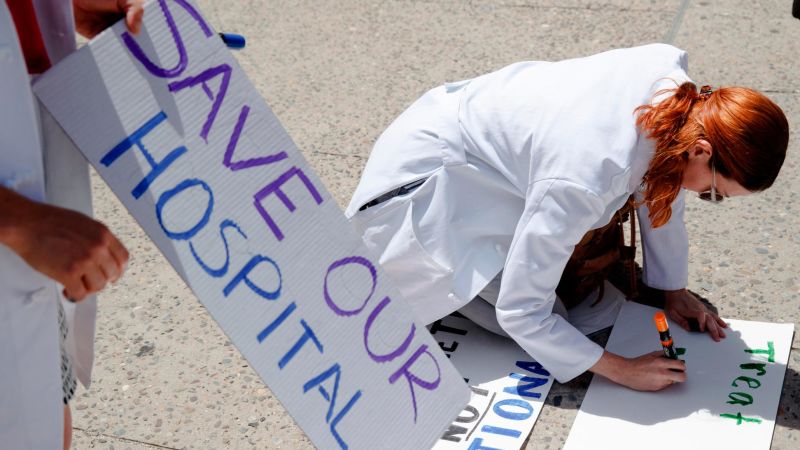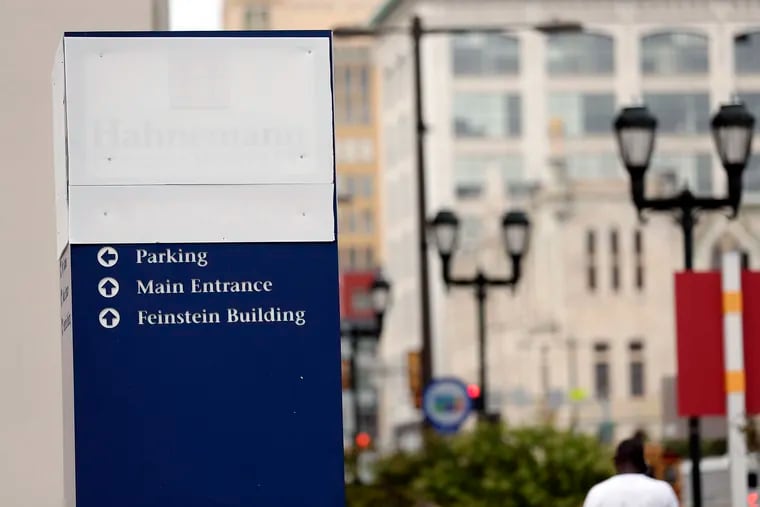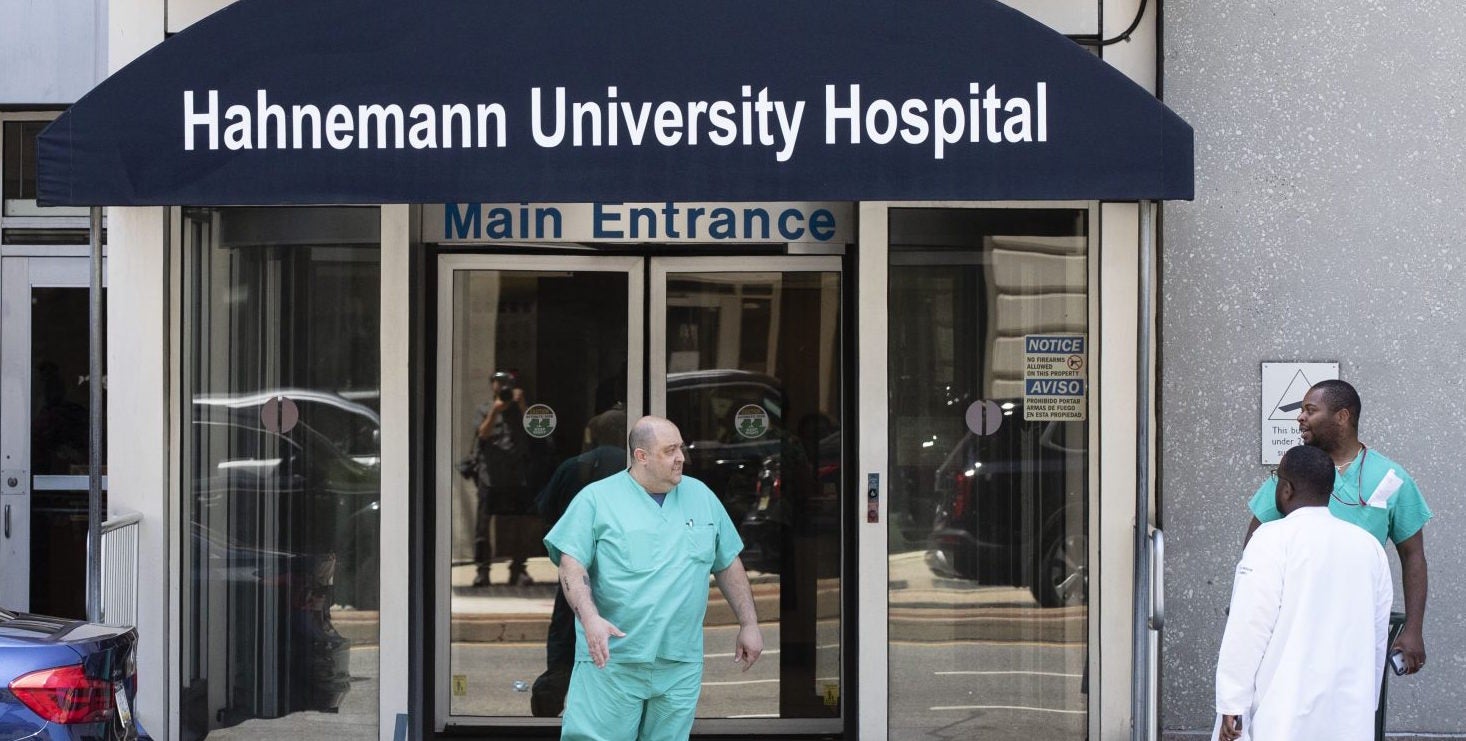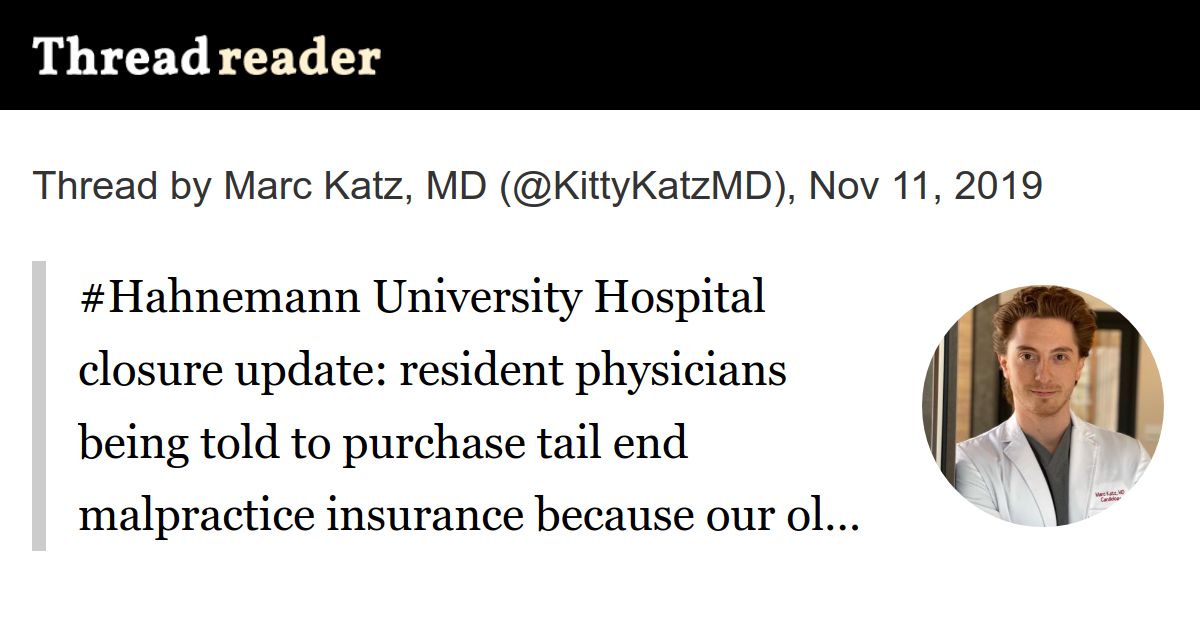- Joined
- Jan 14, 2006
- Messages
- 13,759
- Reaction score
- 24,218




Rich investors may have let a hospital go bankrupt. Now, they could profit from the land | CNN Business
For decades, Hahnemann University Hospital served as the main safety-net hospital for downtown Philadelphia's neediest residents. But soon, the doors will close, leaving a gaping hole in the city's ability to serve its poor. A private equity-backed firm bought the hospital and could let it...www.cnn.com
May well be worse and more on the horizon for other hospitals.

Rich investors may have let a hospital go bankrupt. Now, they could profit from the land | CNN Business
For decades, Hahnemann University Hospital served as the main safety-net hospital for downtown Philadelphia's neediest residents. But soon, the doors will close, leaving a gaping hole in the city's ability to serve its poor. A private equity-backed firm bought the hospital and could let it...www.cnn.com
May well be worse and more on the horizon for other hospitals.


New update: future slots hopefully may go to actual Philly programs, and not Tower.

The $55 million bid that won Hahnemann residency slots was ‘a big surprise’
The winning bid far surpassed the baseline bid of $7.5 million by Tower Health, which has an academic partnership with Drexel University.www.inquirer.com
So yeah those of us who have been saying that hospitals do nothing but make money off of residents by using them to avoid hiring more attendings/NPs/PAs...don't know how much more proof you need right here. Paid about $94,000 per slot which will still make them money because Medicare pays about $100,000 per slot total. They'd apparently love the extra free labor at all their hospitals.

So this is a dark turn:

Bankruptcy judge approves $55 million sale of Hahnemann residency program
The hospital plans to close its doors Friday. Its owner has been wrangling with the federal government for weeks over the residency program was an asset.www.google.com
DOJ and CMS still have one more card to play, they can unilaterally (the federal governmeng can cancel any contract with anyone at anytime for no reason at all, and there is no right to sue for payment under sovereign immunity rules) cancel hahnemann’s medicare provider agreement before 5pm today which destroys the supposed asset (residency contracts) being sold, invalidating the sale. It would be an exceptionally agressive move that would likely upset hospitals, but few consequences beyond that.
Going forward CMS writes the interpretations of congress’s laws concerning how to define the sale of a hospital, and i suspect they will dramatically tighten the rules to say that all assets must be sold together else the resident contracts are voided and essentially returned to CMS to redistribute.
So i doubt that this will actually form a template for other sales, cause CMS getting DOJ involved shows they arr gery serious about preventing this going forwards and will slam the door shut by regulation on future potential sales of residents.
...but there always a risk this is the beginning of a more frightening era of residency programs (and residents) as asset collateral to be traded, its just ny personal hunch that CMS will land hard on closing the gate on this ever happening again
I'm afraid the question of involuntary servitude and the actual status of residents was settled with the Supreme Court's decision in the Mayo Clinic case regarding Social Security taxes.Residents are now officially indentured servants, in case it wasn't clear before.
Residents graduate debt burdened by hundreds of thousands of dollars of medical school debt that they can not discharge. There is no other career option with a medical degree except to go through a medical residency. They are locked into contracts with residency programs and ERAS with no other options and no collective bargaining agreements. They have very limited mobility. If a position is lost for any reason, it can be very hard or impossible to get a new one. If a resident wants to transfer to a new program, the current program basically has to agree to it or they won't get a recommendation and probably cannot switch.
Now residents can be bought and sold as well. It's not exactly slavery--residents can still leave and not be forced back into their positions or jailed for leaving their positions. However, keep in mind that indentured servant contracts in the past could also be bought and sold.
This is an incredible injustice and a mockery of the entire training system.

Did their resident contracts stipulate tail coverage (which is the ACGME requires tail coverage seems likely)? If so, seems like a very easy breach of contract lawsuit.For anyone following this, hahnemann Residents got an email stating they were responsible for tail end coverage of malpractice as the parent company is going to stop providing coverage. The insurance they had purchased was claims based and not occurrence based. This will result in thousands of dollars of payment that residents can’t afford and is a violation of the match contract. Not that it matters to the acgme of course who has provided no help. With all that has occurred, I fail to see how an anti competitive nrmp system is in the best interests of anyone given they are unable to hold these academic insitutions to their own stipulations of a contract that we have no bargaining power or say in.
For anyone following this, hahnemann Residents got an email stating they were responsible for tail end coverage of malpractice as the parent company is going to stop providing coverage. The insurance they had purchased was claims based and not occurrence based. This will result in thousands of dollars of payment that residents can’t afford and is a violation of the match contract. Not that it matters to the acgme of course who has provided no help. With all that has occurred, I fail to see how an anti competitive nrmp system is in the best interests of anyone given they are unable to hold these academic insitutions to their own stipulations of a contract that we have no bargaining power or say in.
With court approval debtors in bankruptcy, Hahnemann's status, may void a contractual obligation. It may be wise for medical students to examine the financial condition of the hospitals they have on their residency rank list.Did their resident contracts stipulate tail coverage (which is the ACGME requires tail coverage seems likely)? If so, seems like a very easy breach of contract lawsuit.


Did their resident contracts stipulate tail coverage (which is the ACGME requires tail coverage seems likely)? If so, seems like a very easy breach of contract lawsuit.

The history of the issue is well documented.For anyone following this, hahnemann Residents got an email stating they were responsible for tail end coverage of malpractice as the parent company is going to stop providing coverage. The insurance they had purchased was claims based and not occurrence based. This will result in thousands of dollars of payment that residents can’t afford and is a violation of the match contract. Not that it matters to the acgme of course who has provided no help. With all that has occurred, I fail to see how an anti competitive nrmp system is in the best interests of anyone given they are unable to hold these academic insitutions to their own stipulations of a contract that we have no bargaining power or say in.
We don't have to guess if the match is better than no match -- there was a time before. And from every account I've read about it, that time was worse for residents. Since an MD without a residency is mostly valueless, hospitals have too much power without the match.Gotta love how PDs try to see the match as being something good. The match forces students to spend big bucks doing multiple interviews. Compare this to my fellowship where there was no match and I went on one interview and got the job the same day.
While definitely ridiculous and embarrassing, it is miles from criminal.The overwhelming continued silence of the ACGME, powers to be, Drexel medicine and several others continues to be nothing short of criminal
Doesn’t seem like anyone really is stepping up. Nice job PAmed society. No pressure whatsoever on anything on Drexel or anyone but the residents to step up and pay themselves. Not really addressed how this will happen or where people will come up with the money but doesn’t really seem to
Matter. Are these organizations made up of physicians so far removed from residency that they have forgotten what it is like? Only thing they can do is complain how much harder they had it and ignore everything else I suppose.
Doesn’t seem like anyone really is stepping up. Nice job PAmed society. No pressure whatsoever on anything on Drexel or anyone but the residents to step up and pay themselves. Not really addressed how this will happen or where people will come up with the money but doesn’t really seem to
Matter. Are these organizations made up of physicians so far removed from residency that they have forgotten what it is like? Only thing they can do is complain how much harder they had it and ignore everything else I suppose.
For anyone still following there is representation for residents however were told there is no chance anything will be fixed in time and the organization has no money. There was a webinar yesterday where people were advised to buy their own insurance or ask the hospitals and organizations for coverage. Some people were lucky and had their hospitals cover the cost. For others who they said no the cost runs from 15-30,000k plus at leastdepending on speciality-looks like either run the risk of not buying it or get the cash because the deadline is too soon for any relief organization to help.
1)looks like most people are advised to take more loans as that is the only way
2)breach of contract doesn’t seem to mean much as there is no assets on hand to pay for this.
3)quoted costs for tail coverage were about 3 million. Drexel almost certainly has this money yet has washed their hands clean.
4)organizations like the NRMP and the ACGME have this cash and their failure to protect residents should necessitate they pay for the coverage imo.
almost willing to bet some of the poster here will say it is not their responsibility and it is the residents to buy this.
Just curious, Was Drexel the last program in your ROL?I would not recommend anyone rank a Drexel residency, or interview for one. I would recommend you go overseas before you consider Drexel as a medical school. Drexel behaved shamefully towards its residents and cut us loose the second it looked like they would have to exert any effort on our behalf. They are not to be trusted to look after you or take care of you or protect you. They should not even be allowed to participate in medical education, but our current system of medical training allows them to continue to do so without consequence.
My program (Pulmonary/Critical Care) had an accreditation visit in the fall of 2018. The ACGME signed off on the validity of our program and the contracts we signed, but somehow did not notice that Hahnemann was already violating those contracts by providing claims made insurance. What good did the ACGME do with our money?
I paid thousands of dollars to the ACGME to participate in the Match. We give up huge amounts of rights to participate in the Match and are told it's for our own good. Hahnemann was not at the top of my list, but because of the match I had no choice but to sign a contract with a hospital that was already breaking that contract. I did what we are all supposed to do.
I am told that we have we pay into the Match as it's a program that is fair, that looks after us and protects us from predatory residency programs, protects us from abuse. There should be no doubt in anyone's mind that those protections are all hollow.
Just curious, Was Drexel the last program in your ROL?
You are right though, if they just underwent a review, that should have been noted that the med Mal was claims based and not occurrence based.
